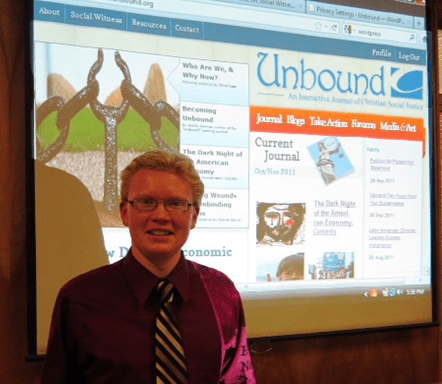4. Work of all kinds is a calling through which we serve God, neighbor, and self. In Reformed theology, work, all work, is understood as a vocation: a response of gratitude to God and of love to neighbor. Through work we contribute not only to the material well-being of our society, but also to its moral quality, particularly its ability to nurture human development. With this understanding of the value and purpose of what we do when we work, we can pursue our earthly callings with vigor. In Christ, however, we reject secular judgments about the value of people and their work based on monetary measures of success expressed in the accumulation of wealth and possessions.
Work is also the way we carry out our responsibility to care for our families. Work, in this sense, embraces both unpaid and paid activities. The economy, often thought to encompass only paid work, includes and impacts both. In the current crisis, middle-income families subject to pay or job loss are experiencing the increase in unpaid work that occurs when family income declines and public services are reduced or eliminated. Perhaps this experience reveals to some of us the hard, time-consuming, but unpaid, work the poor must always do to survive. Because our church values the unpaid work of families, it has called for
a society in which the well-being of every child is nurtured and supported. … in which families have sufficient time together at home to nurture relationships, to care for children and dependents, and to worship God together.[xxix]
Yet it is through paid work that most families gain their essential access “to sufficient economic resources to support the household and care for dependents.”[xxx] Paid work clearly impacts the quality of our communities and our families. It has the power to enhance or deny human dignity and well-being. All of our uniquely human capacities, our cultural creativity, spirituality, and moral sensitivity, require a sufficiency of basic material support (needs). Therefore, the assumption that efficiency and profit are the only legitimate goals of economic institutions is false. The church challenges any economic system that ignores its responsibility to provide the material conditions that support human dignity and encourage the development of human capabilities. For these reasons, the church has long called for economic and political policies that support full and fair employment, including the following principles from God’s Work in Our Hands:
- The foundation upon which all just employment policies are built is access to employment at a level of compensation that allows people to live in dignity and security . . .
- Inequalities in compensation and working conditions demand the strictest scrutiny . . .
- All conditions of paid employment, including compensation and working conditions should sustain and nurture the dignity of individuals, the well-being of households and families, the social cohesiveness of communities, and the integrity of the global environment.[xxxi]
To achieve these and other just employment conditions, the church affirms that people must have the opportunity to participate in economic decisions that will impact them. Thus, the church has long endorsed the right of all workers to choose to organize for collective bargaining.[xxxii] A Social Creed for the 21st Century reaffirms “The rights of workers to organize, and to share in workplace decisions and productivity growth.”[xxxiii]
In contrast to these principles, recent decades have seen stagnation in the wages of most non-supervisory workers and a weakening of workers’ organizations. The percentage of workers covered by employer-based health insurance is declining, as is the percentage covered by pensions. Fewer pensions provide a guaranteed income at retirement. Job elimination has often become the first step in cost reduction. However, in these same decades, the compensation of executives has soared even as the middle class feels increasingly squeezed. In 2007 the average CEOs of major companies earned 275 times what average (nonsupervisory) workers made. Twenty years earlier the ratio was 71 to 1.[xxxiv] Clearly, the benefits of increased productivity have shifted away from most workers and communities to concentrate within the highest levels of management and the primary owners of stock.[xxxv] And when the capital gains or profits from securities are taxed at only half the rate for “earned income,” economic inequality is further reinforced.
Christian discipleship calls us to challenge these practices. We do that when we embody our biblical and Reformed values in our own institutions and work for their embodiment in our secular economy. Christian faith calls us to pray for the imagination, courage and commitment that such discipleship will require.
5. The challenge of Sustainability revives the importance of a tradition of frugality. For some, unfortunately, the word frugality has come to mean a rigidity and austerity that wrings out joyful living. However, in the Reformed tradition its true meaning refers to the virtue of living with moderation as recipients of Christ’s love and as loving neighbors of all others. Its meaning calls upon us as individuals, households, and economic institutions to apply an ethical discipline to our production, distribution, and consumption. It calls upon us to consider the good of all, the covenant community, in which we live – now a global community. John Calvin summarized frugality this way:
We are the stewards of everything God has conferred on us by which we are able to help our neighbor, and are required to render account of our stewardship. . . . the only right stewardship is that which is tested by the rule of love.[xxxvi]
Today, the word “sustainability” expands our understanding of frugality to include the protection of the planet and the real limits of the environment to support an ever-expanding human economy. In the face of poverty and ecological devastation, frugality oriented towards sustainability is an urgent moral responsibility for each of us. Clearly this ethic raises a moral challenge to lifestyles that consume many times over the consumption level of average Americans. However, as those of us who are “average” learn that our lifestyles would require the resources of 4 or more planets if copied by everyone on earth, we too are confronted by the moral challenge of this ethic. In contrast to endless consumerism, the values of frugality and sustainability challenge us to redefine our material needs in light of the needs of others who are our neighbors and God’s children. It challenges us to redefine our material needs in light of the needs of future generations. And it challenges us to redefine our material needs in light of the needs of the earth which first and ultimately belongs only to God.






Unbound Social